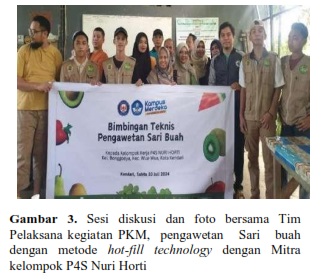Technical Guidance on Fruit Juice Preservation for the P4S Nuri Hori Working Group
Abstract
The Self-Sufficient Agricultural and Rural Training Center (P4S) Nuri Horti is an agricultural training center established with the aim of becoming a self-sufficient training/internship place for urban communities, including students/university students, to learn about horticultural and hydroponic agriculture. Currently, the Nuri Horti group cultivates hydroponic-based vegetables such as bok choy, lettuce, and caisim. and in 2020, they attempted to expand production by offering another option for processing vegetables, namely by making vegetable juices mixed with fruits. However, due to a lack of understanding regarding food preservation, the production was limited, as the products could only last for three days in the refrigerator. Vegetable juices or fruit juices made conventionally without treatment usually have a relatively shorter shelf life, thus affecting the quality of the food products. The quality, nutrition, and taste quickly change and deteriorate. After this guidance, it is expected to provide innovation to the community, especially to the P4S Nuri Horti working group, so that they can know and better understand the methods of preserving healthy and safe fruit juice. For example, maintaining quality, nutrition, and taste, as well as extending the shelf life of the produced fruit juice. The preservation of fruit juice is carried out through pasteurization using the hot-fill technology method. (Hot Fill Technology). Hot filling is a process that uses heat to kill pathogens in food products and then uses that heat to kill pathogens in the container. Thus, the bacteria that cause spoilage in fruit juices and vegetable juices can be eliminated, and the products can last for a relatively longer period

